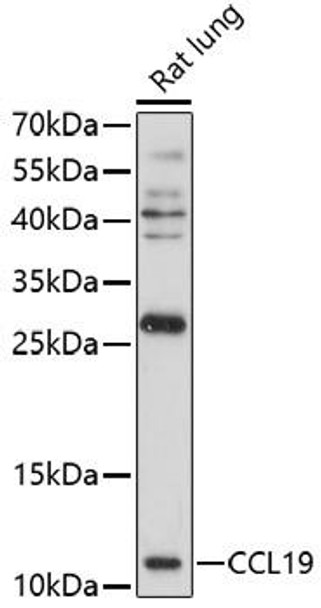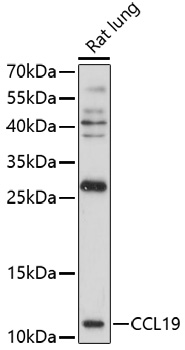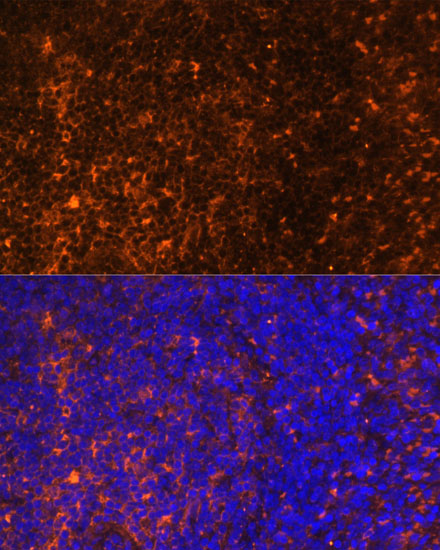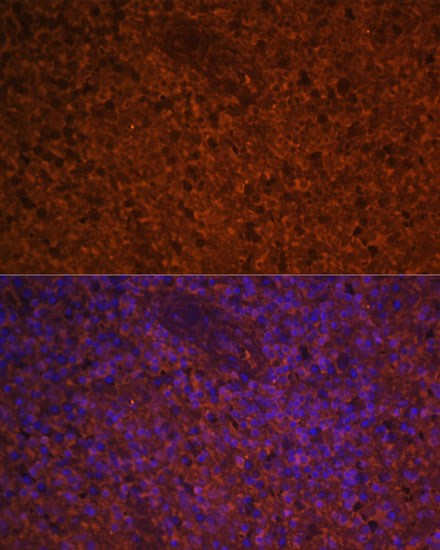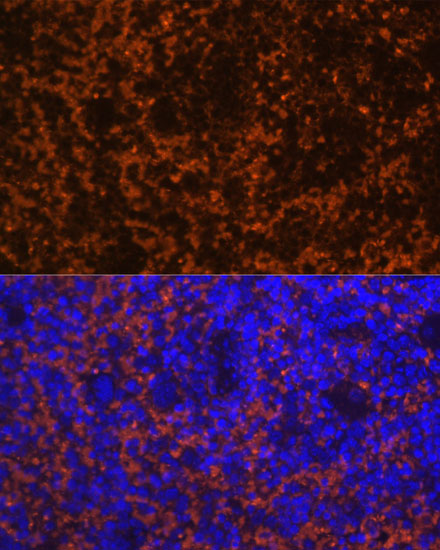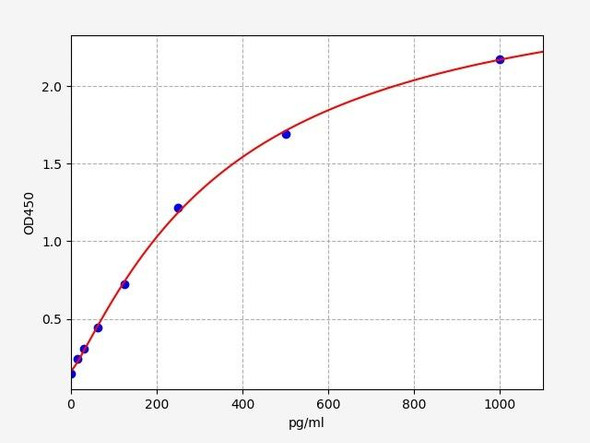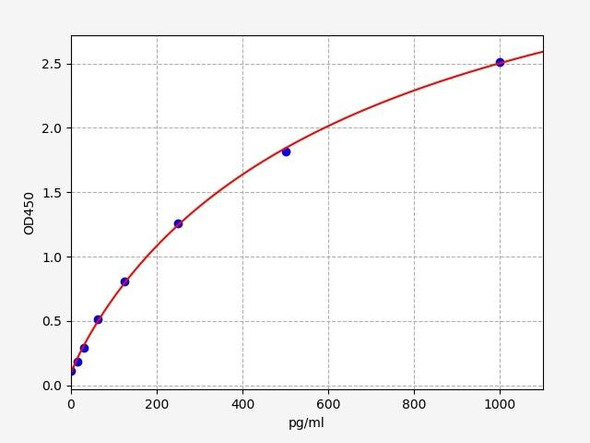Anti-CCL19 Antibody (CAB16972)
- SKU:
- CAB16972
- Product type:
- Antibody
- Reactivity:
- Human
- Mouse
- Rat
- Host Species:
- Rabbit
- Isotype:
- IgG
- Antibody Type:
- Polyclonal Antibody
- Research Area:
- Cell Biology
Description
| Antibody Name: | Anti-CCL19 Antibody |
| Antibody SKU: | CAB16972 |
| Antibody Size: | 20uL, 50uL, 100uL |
| Application: | WB IF |
| Reactivity: | Human, Mouse, Rat |
| Host Species: | Rabbit |
| Immunogen: | Recombinant fusion protein containing a sequence corresponding to amino acids 22-95 of human CCL19 (NP_006265.1). |
| Application: | WB IF |
| Recommended Dilution: | WB 1:500 - 1:2000 IF 1:50 - 1:100 |
| Reactivity: | Human, Mouse, Rat |
| Positive Samples: |
| Immunogen: | Recombinant fusion protein containing a sequence corresponding to amino acids 22-95 of human CCL19 (NP_006265.1). |
| Purification Method: | Affinity purification |
| Storage Buffer: | Store at -20°C. Avoid freeze / thaw cycles. Buffer: PBS with 0.02% sodium azide, 50% glycerol, pH7.3. |
| Isotype: | IgG |
| Sequence: | GTND AEDC CLSV TQKP IPGY IVRN FHYL LIKD GCRV PAVV FTTL RGRQ LCAP PDQP WVER IIQR LQRT SAKM KR |
| Gene ID: | 6363 |
| Uniprot: | Q99731 |
| Cellular Location: | |
| Calculated MW: | 10kDa |
| Observed MW: | Refer to figures |
| Synonyms: | CCL19, CKb11, ELC, MIP-3b, MIP3B, SCYA19 |
| Background: | This antimicrobial gene is one of several CC cytokine genes clustered on the p-arm of chromosome 9. Cytokines are a family of secreted proteins involved in immunoregulatory and inflammatory processes. The CC cytokines are proteins characterized by two adjacent cysteines. The cytokine encoded by this gene may play a role in normal lymphocyte recirculation and homing. It also plays an important role in trafficking of T cells in thymus, and in T cell and B cell migration to secondary lymphoid organs. It specifically binds to chemokine receptor CCR7. |
| UniProt Protein Function: | CCL19: May play a role not only in inflammatory and immunological responses but also in normal lymphocyte recirculation and homing. May play an important role in trafficking of T-cells in thymus, and T-cell and B-cell migration to secondary lymphoid organs. Specifically binds to chemokine receptor CCR7. Recombinant CCL19 shows potent chemotactic activity for T-cells and B-cells but not for granulocytes and monocytes. Belongs to the intercrine beta (chemokine CC) family. |
| UniProt Protein Details: | Protein type:Secreted; Secreted, signal peptide; Motility/polarity/chemotaxis Chromosomal Location of Human Ortholog: 9p13 Cellular Component: extracellular space; extracellular region Molecular Function:CCR chemokine receptor binding; chemokine activity; chemokine receptor binding; CCR10 chemokine receptor binding; CCR7 chemokine receptor binding Biological Process: formation of immunological synapse; positive regulation of interleukin-12 production; positive regulation of dendritic cell antigen processing and presentation; cell maturation; positive regulation of JNK cascade; positive regulation of endocytosis; positive regulation of NF-kappaB import into nucleus; positive regulation of interleukin-1 beta secretion; activation of JNK activity; positive regulation of receptor-mediated endocytosis; dendritic cell chemotaxis; cell communication; establishment of T cell polarity; positive regulation of T cell proliferation; inflammatory response; positive regulation of I-kappaB kinase/NF-kappaB cascade; positive regulation of chemotaxis; response to virus; positive regulation of phosphoinositide 3-kinase activity; positive regulation of tumor necrosis factor production; cellular calcium ion homeostasis; positive regulation of protein kinase B signaling cascade; myeloid dendritic cell chemotaxis; release of sequestered calcium ion into cytosol; positive regulation of protein kinase activity; T cell costimulation; immune response; positive regulation of T-helper 1 cell differentiation |
| NCBI Summary: | This antimicrobial gene is one of several CC cytokine genes clustered on the p-arm of chromosome 9. Cytokines are a family of secreted proteins involved in immunoregulatory and inflammatory processes. The CC cytokines are proteins characterized by two adjacent cysteines. The cytokine encoded by this gene may play a role in normal lymphocyte recirculation and homing. It also plays an important role in trafficking of T cells in thymus, and in T cell and B cell migration to secondary lymphoid organs. It specifically binds to chemokine receptor CCR7. [provided by RefSeq, Sep 2014] |
| UniProt Code: | Q99731 |
| NCBI GenInfo Identifier: | 2842763 |
| NCBI Gene ID: | 6363 |
| NCBI Accession: | Q99731.1 |
| UniProt Secondary Accession: | Q99731,O00697, O00736, |
| UniProt Related Accession: | Q99731 |
| Molecular Weight: | 10,993 Da |
| NCBI Full Name: | C-C motif chemokine 19 |
| NCBI Synonym Full Names: | chemokine (C-C motif) ligand 19 |
| NCBI Official Symbol: | CCL19 |
| NCBI Official Synonym Symbols: | ELC; CKb11; MIP3B; MIP-3b; SCYA19 |
| NCBI Protein Information: | C-C motif chemokine 19; exodus-3; CK beta-11; MIP-3-beta; EBI1 ligand chemokine; EBI1-ligand chemokine; CC chemokine ligand 19; beta chemokine exodus-3; beta-chemokine exodus-3; small-inducible cytokine A19; macrophage inflammatory protein 3 beta; macrophage inflammatory protein 3-beta; epstein-Barr virus-induced molecule 1 ligand chemokine; small inducible cytokine subfamily A (Cys-Cys), member 19 |
| UniProt Protein Name: | C-C motif chemokine 19 |
| UniProt Synonym Protein Names: | Beta-chemokine exodus-3; CK beta-11; Epstein-Barr virus-induced molecule 1 ligand chemokine; EBI1 ligand chemokine; ELC; Macrophage inflammatory protein 3 beta; MIP-3-beta; Small-inducible cytokine A19 |
| UniProt Gene Name: | CCL19 |
| UniProt Entry Name: | CCL19_HUMAN |

